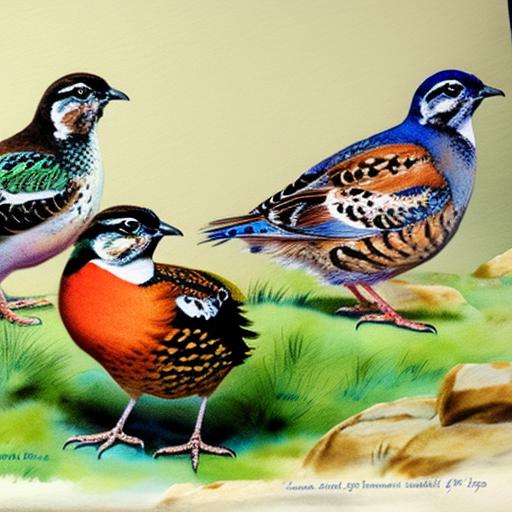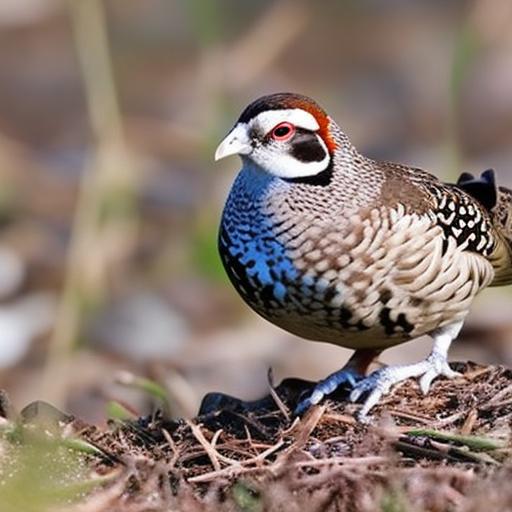Small quail breeds are a popular choice for backyard farming due to their manageable size and ease of care. These small birds are not only adorable but also provide a sustainable source of eggs and meat for the homestead. Small quail breeds are known for their gentle nature and are relatively easy to handle, making them a great option for families with children or individuals looking to start their own small-scale poultry operation.
Small quail breeds come in a variety of colors and patterns, adding a beautiful and unique touch to any backyard farm. They are also known for their efficient egg production, making them a valuable addition to any small farm or homestead. In this article, we will explore the characteristics and traits of small quail breeds, popular breeds for backyard farming, housing and care requirements, breeding and reproduction tips, common health issues, and tips for successfully raising small quail breeds.
Key Takeaways
- Small quail breeds are a popular choice for backyard farming due to their compact size and low maintenance requirements.
- Small quail breeds are known for their gentle nature, high egg production, and ability to thrive in small spaces.
- Popular small quail breeds for backyard farming include the Coturnix quail, Bobwhite quail, and Button quail.
- Housing for small quail breeds should provide adequate space, protection from predators, and proper ventilation.
- Successful breeding and reproduction of small quail breeds requires a balanced diet, proper nesting areas, and careful monitoring of egg production.
Characteristics and Traits of Small Quail Breeds
Small quail breeds are known for their petite size, with most varieties weighing between 3-5 ounces. They have a plump, round body with short, sturdy legs, and a small head with a distinctive plume on top. Small quail breeds come in a variety of colors, including brown, white, black, and speckled patterns, adding a beautiful and unique touch to any backyard farm.
These small birds are known for their gentle and docile nature, making them easy to handle and care for. They are also relatively quiet compared to other poultry, making them an ideal choice for urban or suburban settings where noise may be a concern. Small quail breeds are also efficient layers, with some varieties laying up to 300 eggs per year. Their small size and efficient egg production make them an excellent choice for individuals looking to produce their own eggs for personal consumption or sale.
Popular Small Quail Breeds for Backyard Farming
There are several popular small quail breeds that are well-suited for backyard farming. The Coturnix quail, also known as the Japanese quail, is one of the most popular choices due to its small size, gentle nature, and efficient egg production. Coturnix quail come in a variety of colors, including brown, white, and speckled patterns, making them a beautiful addition to any backyard farm.
Another popular small quail breed is the Bobwhite quail, known for its distinctive call and striking appearance. Bobwhite quail are native to North America and are prized for their delicious meat as well as their efficient egg production. They are also known for their adaptability to various climates and are relatively easy to care for, making them a great choice for beginners.
The California quail is another popular small quail breed known for its striking appearance and sociable nature. These quail are native to the western United States and are prized for their beautiful plumage and distinctive topknot. California quail are relatively easy to care for and can thrive in a variety of environments, making them a great choice for backyard farming.
Housing and Care for Small Quail Breeds
Small quail breeds have relatively simple housing and care requirements, making them an ideal choice for individuals with limited space or resources. A small coop or hutch with a secure wire mesh floor is essential to protect the quail from predators while allowing them to forage on the ground. The coop should also provide protection from the elements and have adequate ventilation to prevent moisture buildup.
Bedding material such as straw or wood shavings should be provided in the coop to absorb waste and provide a comfortable surface for the quail to rest on. Fresh water should be provided at all times, either through a gravity-fed waterer or shallow dish to prevent drowning. Quail also require a balanced diet of commercial quail feed supplemented with fresh greens and protein sources such as mealworms or crickets.
Quail are relatively low-maintenance birds but require regular monitoring to ensure their health and well-being. Regular cleaning of the coop, providing fresh water and feed, and monitoring for signs of illness or injury are essential aspects of caring for small quail breeds.
Breeding and Reproduction of Small Quail Breeds
Breeding small quail breeds can be a rewarding experience for backyard farmers looking to expand their flock or produce their own chicks. Quail reach sexual maturity at around 6-8 weeks of age, making them relatively quick to start breeding. A ratio of one male to every three females is recommended to prevent overbreeding and aggression among the males.
Quail are prolific layers, with females laying an egg every 1-2 days during the breeding season. Eggs can be collected and placed in an incubator or left with the hens to brood naturally. Incubation takes approximately 17-18 days, after which the chicks will hatch and require careful monitoring and care to ensure their survival.
Chick mortality can be high in quail due to their small size and fragile nature, so providing a warm, dry environment with access to fresh water and feed is essential. Chicks should be kept separate from adult birds until they are fully feathered and able to fend for themselves. With proper care and attention, breeding small quail breeds can be a successful and rewarding endeavor for backyard farmers.
Health and Common Issues in Small Quail Breeds

Small quail breeds are generally hardy birds but can be susceptible to certain health issues if not properly cared for. Common health issues in small quail breeds include respiratory infections, parasites such as mites or lice, and injuries from predators or aggressive behavior from other birds.
Preventative measures such as regular cleaning of the coop, providing a balanced diet, and monitoring for signs of illness or injury can help prevent many common health issues in small quail breeds. It is also important to quarantine new birds before introducing them to an existing flock to prevent the spread of disease.
If health issues do arise, it is important to seek veterinary care from a professional experienced in treating poultry. Early intervention can often prevent the spread of illness and improve the chances of recovery for sick or injured birds.
Tips for Raising Small Quail Breeds Successfully
Raising small quail breeds successfully requires attention to detail and regular monitoring of the birds’ health and well-being. Providing a clean, secure coop with access to fresh water and feed is essential for the overall health of the birds. Regular cleaning of the coop and monitoring for signs of illness or injury can help prevent many common health issues in small quail breeds.
Proper nutrition is also essential for raising healthy quail. A balanced diet of commercial quail feed supplemented with fresh greens and protein sources such as mealworms or crickets will help ensure that the birds receive all the nutrients they need to thrive.
Breeding small quail breeds can be a rewarding experience but requires careful monitoring and attention to detail. Providing a warm, dry environment for hatching chicks and monitoring their progress closely can help improve their chances of survival.
In conclusion, small quail breeds are an excellent choice for backyard farming due to their manageable size, gentle nature, and efficient egg production. By providing proper housing, care, nutrition, and attention to breeding and health issues, individuals can successfully raise small quail breeds on their homestead or small farm. With the right knowledge and dedication, raising small quail breeds can be a rewarding experience that provides a sustainable source of eggs and meat for the whole family.
If you’re considering raising small quail breeds, you may also be interested in learning about the benefits of the Snaplock Chicken Coop. This innovative coop design from Poultry Wizard provides a secure and convenient housing solution for your poultry. Check out their article on Snaplock Chicken Coop to discover how it can enhance your quail-raising experience.
FAQs
What are some small quail breeds?
Some small quail breeds include the Japanese quail, the Coturnix quail, and the Button quail.
What are the characteristics of small quail breeds?
Small quail breeds are known for their compact size, gentle nature, and relatively quiet demeanor. They are also known for their colorful plumage and are popular for their egg-laying abilities.
What are the benefits of raising small quail breeds?
Raising small quail breeds can be beneficial for their small size, which makes them easier to care for and requires less space. They are also known for their high egg production and can be a good source of protein for their meat.
What type of housing do small quail breeds require?
Small quail breeds can be housed in a variety of enclosures, including cages, aviaries, or coops. They require protection from predators and access to clean water and a balanced diet.
What do small quail breeds eat?
Small quail breeds typically eat a diet of commercial quail feed, supplemented with fresh greens, insects, and grit. It’s important to provide them with a balanced diet to ensure their health and egg production.
Meet Walter, the feathered-friend fanatic of Florida! Nestled in the sunshine state, Walter struts through life with his feathered companions, clucking his way to happiness. With a coop that’s fancier than a five-star hotel, he’s the Don Juan of the chicken world. When he’s not teaching his hens to do the cha-cha, you’ll find him in a heated debate with his prized rooster, Sir Clucks-a-Lot. Walter’s poultry passion is no yolk; he’s the sunny-side-up guy you never knew you needed in your flock of friends!








I cannot find my quail breed anywhere. Can you help?
Hi Belinda, I could possibly help. What type of quail are you after and where do you live? If you can’t find live quail the best method is to buy fertilized eggs and incubate them yourself. Quite easy to do and allows you to order from websites!